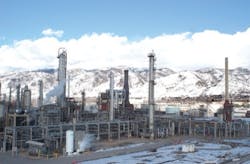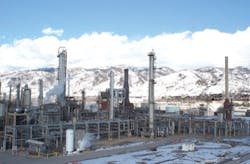Salazar to end federal oil and gas RIK program
US Interior Sec. Ken Salazar beat a US House committee to the punch and announced plans to eliminate the US Minerals Management Service's royalty-in-kind (RIK) program on Sept. 16.
His announcement came during his opening statement to the House Natural Resources Committee in the first day of hearings on a sweeping federal minerals reform bill that its chairman, Nick J. Rahall (D-W.Va.), introduced on Sept 8. The measure includes a provision ending the RIK program.
"The royalty-in-kind program has been a blemish, in my view, on this department. It is time for us to end it," said Salazar. "It was set up at a time when people felt the department could make more money from selling oil and gas on the open market than in taking royalties. It was created by administrative order, and I intend to end it."
He told reporters following the hearing that it will take about a year to shut the program down because several of its components operate under contracts. "We expect to issue the order in the coming weeks," he said.
MMS Director S. Elizabeth Birnbaum and BLM Director Robert V. Abbey will work with Wilma A. Lewis, assistant interior secretary for land and minerals management, in making the transition from the RIK program to a more transparent and accountable royalty collection operation, Salazar told the committee.
"Bravo, bravo, bravo," Rahall said after Salazar finished his opening statement. "I have called for its elimination for years because it has so many problems."
The program drew especially heavy fire in September 2008 after an investigation by the Department of the Interior's inspector general found federal RIK employees in Denver were paid for outside work, abused drugs and alcohol, and solicited sex.
Different conclusions
Rep. Cynthia Lummus (R-Wyo.) noted that Salazar's predecessor as interior secretary, Dirk A. Kempthorne, formed an independent committee chaired by former Sens. J. Robert Kerrey (D-Neb.) and Jake Garn (R-Utah) which investigated the government's minerals royalty programs and reached different conclusions. One of those was that the RIK program should be scrapped onshore but retained offshore because of significantly bigger takeaway volumes, she said.
Salazar said he was acquainted with the committee's work and would consider its recommendations.
American Petroleum Institute President Jack N. Gerard said the RIK program collected $6.6 billion in oil and gas deliveries during fiscal 2008 and is one of the federal government's largest sources of nontax revenue. "Terminating this straightforward method of handling royalty payments runs the risk of raising administrative costs and adding additional layers of paperwork required to determine the value of oil and gas production," he said.
Senate Energy and Natural Resources Committee Chairman Jeff Bingaman (D-NM) apparently wasn't surprised, since the Government Accountability Office issued two reports before the hearing calling for major federal royalty management reforms. "GAO's rebuke of the way [DOI] collects royalties is just the latest red flag that the American people are not getting a fair return for the oil and gas resources they own," he said. "We'll be taking a careful look at the administration's proposals to overhaul the flawed royalty management program."
Salazar told the committee that phasing out the RIK program is part of a broader effort to improve minerals royalty collections within DOI. He said Lewis was leading a two-track department-wide minerals royalty policy review of possible administrative and legislative actions. "There's a lot we can do to simplify the collection of federal royalties," the secretary said.
In his written statement, he said the administration has not had an opportunity to fully analyze Rahall's bill, which also includes a provision combining the US Bureau of Land Management and MMS into a single Office of Federal Energy and Minerals Leasing.
Administrative actions
Many of the bill's provisions can be achieved through administrative actions, Salazar told the committee. "For example, I am developing options to improve the coordination between [MMS and BLM] in onshore and offshore leasing and revenue management policies related to domestic energy production, both conventional and renewable, from federal lands," he said. "I intend to bring needed coordination and strategic guidance to the department's energy development programs and to its implementation of significant reforms, including recommendations from the reports of the GAO and the Office of the Inspector General."
Republican committee members criticized Rahall's bill and Salazar's actions since becoming interior secretary. "In your time at [DOI], you have essentially blocked energy development across-the-board," Rep. Michael Coffman, a freshman from Colorado, told Salazar. "We can't drill onshore, we can't drill offshore, we can't develop oil shale, we can't develop uranium deposits, and you haven't issued any new solar permits."
Salazar disagreed, citing continued oil and gas lease sales at BLM and MMS and revised oil shale technology assessment programs.
Another GOP freshman, Bill Cassidy from Louisiana, suggested that Rahall's bill creates contradictions in calling for more expeditious oil and gas production while increasing the potential for bureaucratic delays.
"There is room for us to improve," Salazar responded. "Technologies such as horizontal drilling create opportunities today that were not available 30 years ago. We're also aware that several private landowners and oil and gas producers are taking approaches which may be more efficient than the federal government's. We'd like to look into these."
When Robert J. Wittman (R-Va.) asked about the status of a lease sale scheduled off Virginia's coast in 2011 as part of the MMS's 2007-12 OCS plan, Salazar said that DOI was looking at it but added that there hasn't been new information about Atlantic US offshore resources for decades. "Virginia has the opportunity to be the first new leasing area on the East Coast, not just for conventional but also renewable resources," Wittman said.
"I think one area where you can expect bipartisan support there is natural gas," Salazar replied. "There are indications that there may be substantial amounts out there." Responding to a question about Atlantic OCS leasing in general from Doug Lamborn (R-Colo.), ranking minority member of the committee's Energy and Mineral Subcommittee, the secretary said that more current information is necessary because "what's out there could turn out to be a big nothing."
More Oil & Gas Journal Current Issue Articles
More Oil & Gas Journal Archives Issue Articles

